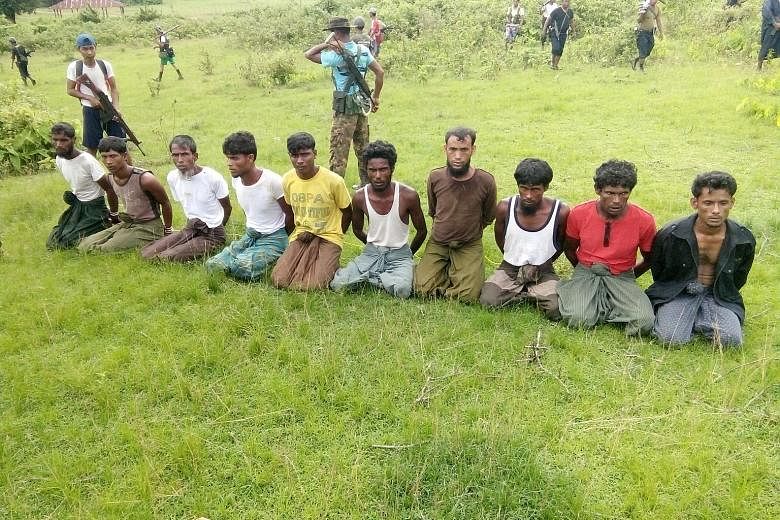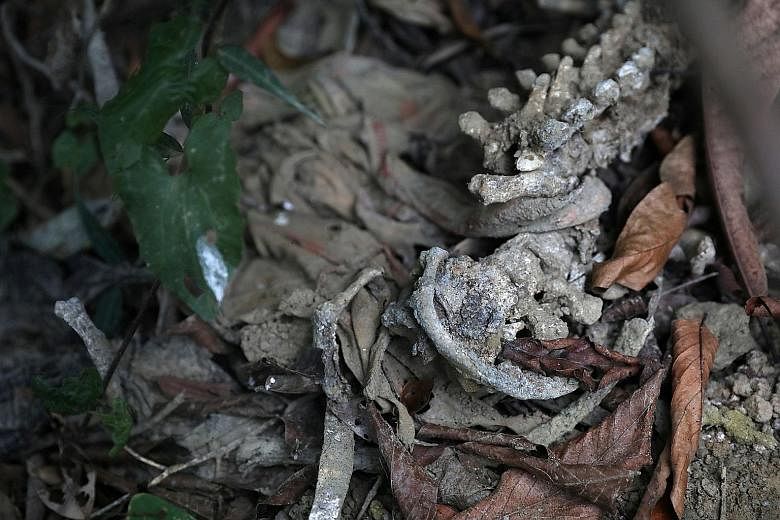NEW YORK • Many nations, including the United States, Canada and several European countries, as well as top United Nations officials are among those calling for the release of two Reuters reporters from detention in Myanmar.
Wa Lone, 31, and Kyaw Soe Oo, 27, were arrested on Dec 12 last year after being invited to meet police officials on the outskirts of Yangon.
The pair are now facing up to 14 years in prison on charges of possessing classified documents in violation of the colonial-era Official Secrets Act.
Reuters on Friday published a special report describing how Myanmar troops and Buddhist villagers executed 10 Rohingya men in Rakhine state's Inn Din village on Sept 2 last year before dumping their bodies into a mass grave.
"The Reuters investigation of the Inn Din massacre was what prompted Myanmar police authorities to arrest two of the news agency's reporters," the report said.
During an appearance last Tuesday at the Insein district court in Yangon, a police officer who was part of the team that arrested the pair testified that he had burned the notes he made at the time, but did not say why he had done so.
Judges have denied bail to the two reporters during a pre-trial hearing period, despite calls for their release from human rights groups and diplomats around the world. The next hearing is scheduled for Wednesday.
Referring to the reporters, US Ambassador to the United Nations Nikki Haley said: "Independent reporting like theirs highlights the urgent need for Burmese authorities to cooperate with an independent and credible investigation into any allegations of atrocities in Rakhine."
She referred to Myanmar by its former name Burma in her statement. "Journalists must never be arrested for doing their jobs," she added.
The United Nations on Friday described the details of the Reuters report as "alarming" and said that it showed the need for a "full and thorough investigation" into the violence in Rakhine state in western Myanmar.
Nearly 690,000 Rohingya have fled their villages and crossed the border into Bangladesh since last August, when a series of insurgent raids prompted a military backlash so brutal the UN has said it probably amounts to ethnic cleansing of the Muslim minority.
UN Secretary-General Antonio Guterres has called on the international community "to do whatever it can" to secure the release of the two journalists.
The Reuters report drew on interviews with Buddhists who confessed to torching Rohingya homes, burying bodies and killing Muslims in what they said was a frenzy of violence triggered when Rohingya insurgents attacked security posts last August.
The account marked the first time soldiers and paramilitary police have been implicated by testimony from security personnel in arson and killings in the north of Rakhine state.
In the story, Myanmar said its "clearance operation" is a legitimate response to attacks by Rohingya insurgents.
Asked about the evidence Reuters had uncovered about the massacre, Myanmar government spokesman Zaw Htay said on Thursday before the report was published: "We are not denying the allegations about violations of human rights. And we are not giving blanket denials."
If there was "strong and reliable primary evidence" of abuses, the government would investigate, he said.
British Labour Party lawmaker Rosena Allin-Khan told the BBC the Reuters report was consistent with accounts she had heard while working as a doctor at Rohingya refugee camps in Bangladesh last year.
"We've been bystanders to a genocide," she said. "This evidence marks a turning point because, for the first time since this all started to unfold in August, we have heard from the perpetrators themselves."
She said that, as well as an international probe, there needed to be a referral to the International Criminal Court.
REUTERS


